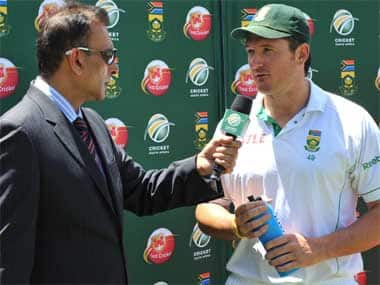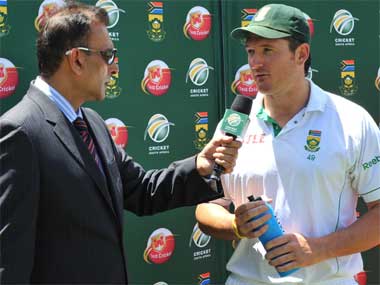Last week, as muscleman Nadal’s backhands were getting the better of Federer’s precision at Roland Garros, analyses from the Rafa-Fedex Book of Rivalry began tumbling out again, and threaten to be around till the men’s final at Centre Court, Wimbledon is done with. While sifting through ball talk such as the Swiss’ ‘clay fatigue’ and the Spaniard’s splendid ‘convertibility of set points’, the cricket-bred Asian in me couldn’t help but snigger and think: why complicate… it’s like Sehwag beating Rahul Dravid. This super-commentator skill of viewing other-sportly and sometimes completely unconnected events from a cricketing hawk-eye has, believe it or not, been gifted to many of us. [caption id=“attachment_26628” align=“alignleft” width=“380” caption=“Ravi Shastri’s (L) career as a TV host is roughly four times longer than that as a player. Getty Images”]
 [/caption] Since this ability still doesn’t find a scientific term nor is it being considered as a paying skill by HR departments yet, let me explain it for wider understanding. Cricketopia (assuming it to be a talented cousin of myopia), apart from viewing life’s phenomena as elements of a cricket encounter, is living with that Harsha Bhoglesque/Geoff Boycottish perspective of them in your head. This blood group emanates from deep understanding of the game, gradually acquired by many through years of social conditioning such as watching dozens of Sharjah matches, witnessing five foiled World Cup bids, dissecting friendship matches in Toronto, miming Tony Greig’s commentary as well as playing the blessed game in all its forms in one’s streets. Having been raised on this diet, this skill gets entrenched in one’s mind like a mother tongue and all subsequent non-cricket views are simply translations. For instance, your manager giving your team a multi-million sales target would immediately make you feel like the ‘last recognised batsman chasing at eight-plus runs an over’. Or your girlfriend repeatedly asking for her brother’s opinion would remind you of the ‘third umpire’. And it’s not only us cricket experts-par-excellence who display this prowess with ease, there are some players who find themselves doing it. Take English spinner Graeme Swann’s classic case last Sunday when the Toronto GP was interrupted by rain. While some began cracking the predictable and lame Duckworth-Lewis jokes, Swanny belted out this classic on his Twitter account: “Rain stopped play at the Canadian grand prix. Umpires have called an early tea, restart 1925, 45 overs left in the day.” With the finesse, the vision with which the man put the event in perspective, I’m sure the spectator-starved sport of Formula One would’ve earned some cricket fans’ attention. Then there are popular cricketopia terms which have seeped so deep in our vocabs, one doesn’t even realise when they’re used outside of cricket. Take our dailies using ‘Supreme Court no-balls CBI probe’ or ‘BMC’s revamp hit for six’ in their headlines. They’re so rampant, soon it will be time to borrow boring terms from other spheres of civilisation to replenish cricket’s vocabulary. (‘Tight bowling adjourns Raina onslaught’ for example). There is, however, a dark, sweaty side to every ball and this subliminal talent too is no exception. Shastri-isms for one. Named after the man whose career as a TV host is roughly four times longer than that as a player, these phrases have shot through our talent like a tracer bullet. When Ravi Shastri hits out these clichés, they stay hit or often behave like tricky customers. So while some are being able to pepper these with ease in routine life (like saying ‘I just get the feeling something’s gotta give’ to your constipated dog), in the end, cricket is not the winner. Another rather embarrassing prospect for Cricketopia talents is that when they dole out their 22-yard perspectives to unsuspecting audiences who’ve got nothing to do with cricket (namely, some African/far European nationals and some IPL franchisees), chances are that they’ll be met with straight faces. Imagine Manmohan Singh speaking (no wait, that’s too wild an imagination) okay, Pranab Mukherjee speaking about India’s economy and comparing it with Yusuf Pathan’s robust all-round career to visiting investors from Slovenia, it ain’t going to work. Nor is explaining your mother-in-law that her daughter makes you feel like a 12th man all the time. As with all talents, cricketopia too blooms only after being pitted against a knowledgeable audience at the right time. It’s only a matter of time before this approach to life is picked up by a management guru to churn out a bestseller from or maybe before BCCI makes it a new law. It will only be fair to raw talents like myself who often face the scorn of ‘sports’ connoisseurs and society at large for viewing the world from a single lens. Till then, we will have to just be content with pitching it in the right areas.
[/caption] Since this ability still doesn’t find a scientific term nor is it being considered as a paying skill by HR departments yet, let me explain it for wider understanding. Cricketopia (assuming it to be a talented cousin of myopia), apart from viewing life’s phenomena as elements of a cricket encounter, is living with that Harsha Bhoglesque/Geoff Boycottish perspective of them in your head. This blood group emanates from deep understanding of the game, gradually acquired by many through years of social conditioning such as watching dozens of Sharjah matches, witnessing five foiled World Cup bids, dissecting friendship matches in Toronto, miming Tony Greig’s commentary as well as playing the blessed game in all its forms in one’s streets. Having been raised on this diet, this skill gets entrenched in one’s mind like a mother tongue and all subsequent non-cricket views are simply translations. For instance, your manager giving your team a multi-million sales target would immediately make you feel like the ‘last recognised batsman chasing at eight-plus runs an over’. Or your girlfriend repeatedly asking for her brother’s opinion would remind you of the ‘third umpire’. And it’s not only us cricket experts-par-excellence who display this prowess with ease, there are some players who find themselves doing it. Take English spinner Graeme Swann’s classic case last Sunday when the Toronto GP was interrupted by rain. While some began cracking the predictable and lame Duckworth-Lewis jokes, Swanny belted out this classic on his Twitter account: “Rain stopped play at the Canadian grand prix. Umpires have called an early tea, restart 1925, 45 overs left in the day.” With the finesse, the vision with which the man put the event in perspective, I’m sure the spectator-starved sport of Formula One would’ve earned some cricket fans’ attention. Then there are popular cricketopia terms which have seeped so deep in our vocabs, one doesn’t even realise when they’re used outside of cricket. Take our dailies using ‘Supreme Court no-balls CBI probe’ or ‘BMC’s revamp hit for six’ in their headlines. They’re so rampant, soon it will be time to borrow boring terms from other spheres of civilisation to replenish cricket’s vocabulary. (‘Tight bowling adjourns Raina onslaught’ for example). There is, however, a dark, sweaty side to every ball and this subliminal talent too is no exception. Shastri-isms for one. Named after the man whose career as a TV host is roughly four times longer than that as a player, these phrases have shot through our talent like a tracer bullet. When Ravi Shastri hits out these clichés, they stay hit or often behave like tricky customers. So while some are being able to pepper these with ease in routine life (like saying ‘I just get the feeling something’s gotta give’ to your constipated dog), in the end, cricket is not the winner. Another rather embarrassing prospect for Cricketopia talents is that when they dole out their 22-yard perspectives to unsuspecting audiences who’ve got nothing to do with cricket (namely, some African/far European nationals and some IPL franchisees), chances are that they’ll be met with straight faces. Imagine Manmohan Singh speaking (no wait, that’s too wild an imagination) okay, Pranab Mukherjee speaking about India’s economy and comparing it with Yusuf Pathan’s robust all-round career to visiting investors from Slovenia, it ain’t going to work. Nor is explaining your mother-in-law that her daughter makes you feel like a 12th man all the time. As with all talents, cricketopia too blooms only after being pitted against a knowledgeable audience at the right time. It’s only a matter of time before this approach to life is picked up by a management guru to churn out a bestseller from or maybe before BCCI makes it a new law. It will only be fair to raw talents like myself who often face the scorn of ‘sports’ connoisseurs and society at large for viewing the world from a single lens. Till then, we will have to just be content with pitching it in the right areas.
Malay Desai is a feature writer with a penchant for travel, food and test cricket. But as none of those pay his credit card bills, he runs the content firm Punchlines.'
)